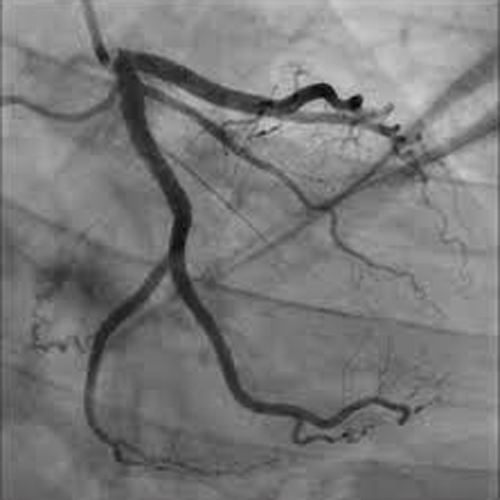
A coronary angiogram is an X-ray test that uses contrast dye to study the coronary arteries (also known as blood vessels) supplying blood and oxygen to the heart. Our arteries can become clogged due to buildup of cholesterol or other substances. Having blocked or narrowed arteries can be very serious as it prevent blood and oxygen flowing to heart, causing discomfort or pain (angina). In cases where the narrowed arteries are blocked off suddenly and completely, a heart attack will occur due to lack of oxygen to the heart.
An angiogram is an invasive, non-surgical procedure done at the catheterisation lab and is a day case procedure. Local anaesthetic will be administered at the puncture site, usually wrist or groin. A thin tube (catheter) will be inserted into the artery, followed by a small amount of contrast dye injected through it. The dye appears as dark areas as it flows through the artery showing location of any narrowing and blockages inside of an artery and the level of blockage.
The X-ray images captured allows the cardiologist to visualise the condition of the coronary arteries and see if treatment such as angioplasty or stent, coronary artery bypass surgery (CABG) or medical therapy is needed. Not all blockages require procedures, certain level of narrowing and blockages can be treated with medication and change in lifestyle like maintaining a lower cholesterol, healthy diet and controlling of blood pressure.
Cardiac Investigations
Cardiac Investigations
Cardiac Investigations
Cardiac Investigations
Cardiac Investigations
Cardiac Investigations
Cardiac Investigations
Cardiac Investigations
Cardiac Investigations
Cardiac Investigations
Cardiac Investigations
Dr Pipin Kojodjojo specializes in cardiac electrophysiology and management of heart rhythm disorders in both adolescents and adults.
Experienced in managing patients with atrial fibrillation and unexplained blackouts (syncope).
Dr Chuang Hsuan-Hung is a heart failure intensivist trained in advanced cardiovascular imaging. He specialises in heart failure and heart transplant intensive care.
Experienced in managing genetic heart disease, cardio-oncology and sports cardiology.
Dr Stanley Chia is an interventional cardiologist with a distinguished academic record.
He is skilled and experienced in managing complex cardiovascular disease and difficult coronary interventional procedures like stenting of the left main artery.
Dr Jeremy Chow is an electrophysiologist specialising in the implantation and management of electronic cardiac devices.
Experienced in arrhythmia management, stroke prevention and trained in procedures such as electrophysiology studies and ablations.
Dr Tan Chong Hiok is an interventional cardiolgist trained and specialises in stenting of the left main artery and chronic total occlusion.
He is experienced in managing complex cases in patients who have declined or are unsuitable for bypass surgery.
Dr Goh Ping Ping is an echocardiologist trained in imaging of the heart.
She is a strong advocate of preventive cardiology and awareness for women’s heart health. She manages a broad spectrum of cardiovascular disease including heart attack patients.
Dr Chan Wan Xian is a heart failure intensivist specialised in managing complex heart failure and patients with mechanical hearts.
Trained in cardiac imaging and she is experienced is treating women at risk of heart disease, especially during pregnancy.
Dr Edgar Tay is an interventional cardiologist specialised in structual heart disease, adult congenital and pulmonary hypertension.
Trained in procedures like TAVI, Mitralclip and pulmonary angioplasty for chronic thromboembolic pulmonary hypertension.
Dr Cliff Wong is an echocardiologist trained in imaging of the heart.
He specializes in cardiac imaging (echocardiography and cardiovascular computed tomography). Experienced in managing cardiomyopathy, heart failure, valvular heart diseases and cardio-oncology.
Book an Appointment